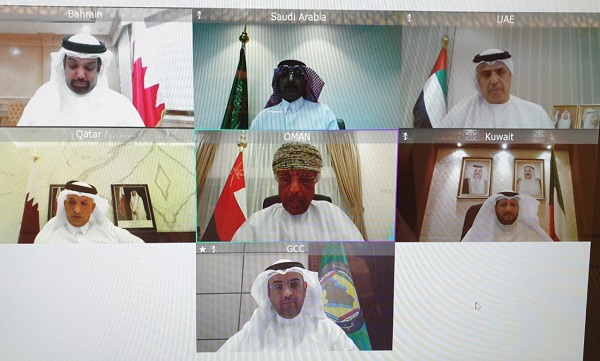 At the invitation of HE the Secretary General of the Gulf Cooperation Council, the GCC Financial and Economic Cooperation Committee held on Monday, 23 March 2020, a videoconference, to discuss the financial and economic impacts of the emerging Coronavirus (COVID-19) Epidemic. This is in light of the GCC Ministries of Finance role that aims to enhance financial stability, support the economies of the GCC states, stimulate the economy and the affected economic activities, stand with the private sector and support it to enable it to play its role in enhancing economic growth under the current exceptional circumstances, and to assess new developments and precautionary measures that the GCC States took to confront this epidemic and its financial requirements, and raise the efficiency of financial and economic performance.
At the invitation of HE the Secretary General of the Gulf Cooperation Council, the GCC Financial and Economic Cooperation Committee held on Monday, 23 March 2020, a videoconference, to discuss the financial and economic impacts of the emerging Coronavirus (COVID-19) Epidemic. This is in light of the GCC Ministries of Finance role that aims to enhance financial stability, support the economies of the GCC states, stimulate the economy and the affected economic activities, stand with the private sector and support it to enable it to play its role in enhancing economic growth under the current exceptional circumstances, and to assess new developments and precautionary measures that the GCC States took to confront this epidemic and its financial requirements, and raise the efficiency of financial and economic performance.
 The meeting was chaired by HE Obaid Humaid Al Tayer, Minister of State for Financial Affairs of the United Arab Emirates, during which their Excellencies the GCC Ministers of Finance reviewed the precautionary measures and efforts undertaken by Member States to ensure the provision of the financial requirements necessary to implement the preventive and direct measures to deal with the consequences of the epidemic and limit its spread, enhancing confidence in the economies of the GCC states, achieving financial sustainability, and taking all measures to ensure the flow of basic goods and services to the GCC citizens and residents on a regular basis. As well as strengthening the cooperation between member states, stimulating the economy and affected economic activities, supporting the private sector and enabling it to play its role in enhancing economic growth, and the role of National Development and Investment funds to mitigate the negative effects of the emerging Coronavirus (COVID-19) expected on all economic sectors in each of the GCC States.
The meeting was chaired by HE Obaid Humaid Al Tayer, Minister of State for Financial Affairs of the United Arab Emirates, during which their Excellencies the GCC Ministers of Finance reviewed the precautionary measures and efforts undertaken by Member States to ensure the provision of the financial requirements necessary to implement the preventive and direct measures to deal with the consequences of the epidemic and limit its spread, enhancing confidence in the economies of the GCC states, achieving financial sustainability, and taking all measures to ensure the flow of basic goods and services to the GCC citizens and residents on a regular basis. As well as strengthening the cooperation between member states, stimulating the economy and affected economic activities, supporting the private sector and enabling it to play its role in enhancing economic growth, and the role of National Development and Investment funds to mitigate the negative effects of the emerging Coronavirus (COVID-19) expected on all economic sectors in each of the GCC States.
The GCC Ministers of Finance praised the urgent initiatives undertaken by Member States to support the private sector, especially small and medium enterprises and economic activities most affected by the consequences of this epidemic, as a contribution to support these activities and reduce their vulnerability to the preventive and direct measures taken to deal with the disease and limit its spread and its economic and social impact.
The Minister of Finance and Minister of Economy and Planning in charge, in the Kingdom of Saudi Arabia also reviewed the role of the Kingdom of Saudi Arabia as Chairman of the G20 in dealing with this crisis and what the finance ministers and central bankers of the G20 countries are doing to support the global economy during this stage.
In this regard, their Excellencies the GCC Ministers of Finance assured that the GCC States would contribute with the countries of the world by taking all necessary measures to achieve strong, sustainable, balanced and comprehensive growth, and to prevent the negative risks of this epidemic and its repercussions on the global economy.
Their Excellencies, the GCC Ministers of Finance, stressed the need to coordinate precautionary measures among the GCC States on all sectors to support economic recovery, unify the measures taken to limit the spread of the epidemic, and facilitate the movement of goods between the GCC States, especially goods and shipments related to consumer and basic materials and materials related to economic growth in general.
Their Excellencies, the Ministers of Finance also directed the GCC General Secretariat to inform the GCC Financial and Economic Cooperation Committee of the results of the meetings of the ministerial and technical committees held to discuss the financial and economic impacts of the emerging Coronavirus (COVID-19), as well as preparing weekly reports on the steps taken by each Member State to prevent the negative risks of the emerging Coronavirus (COVID-19) and provide them to all Member States.
For more information, please click here.
